Shai Hills
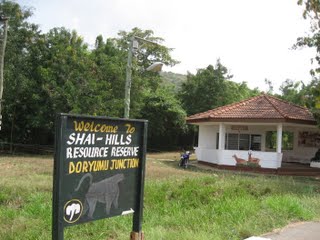 With all of my teaching responsibilities finished, I decided I should explore a bit more of Ghana. Emily says that one of her favorite places to visit is Shai Hills, a day trip out of Accra. So, I decide to check it out. I get up early and a couple hours and a couple tro-tro rides later, I arrive. A guide takes me on a two-hour hike, mostly along a road until we get to a cave where people used to hide from slave raiders. 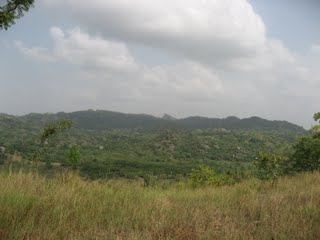 I would say that Shai Hills is ... well, ok. It's probably not as nice as Ten Thousand Hills State Park outside of Kirksville, or Indians Hills outside of Madison, two of my favorite "local" places to hike. In fact, except for the absence of onions, the place reminded me a bit of Sebaco where the flat plains outside of Managua begin to climb into the beautiful Matagalpa/Jinotega mountains. The Accra plain stretching out to Shai is similarly, well, ugly, but unlike Nicaragua the Shai Hills do not continue to climb upwards. 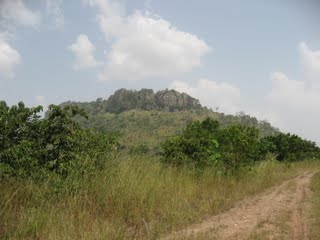 It's only 11am, my hike is over, I'm in a good mood, and so I decide to continue exploring. Fifteen minutes up the road is the Krobo Mountain Community Reserve. The person in charge at Shai Hills says that he has never been there. My guide says that it is similar to what we just did at Shai Hills, only he says that it involves climbing a mountain, and he gives me that look of doubt that this old man could make it. Nevertheless, I decide to check it out. I probably should have turned around and gone back home. 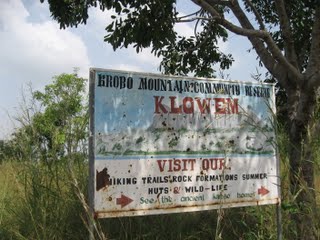 First, I miss the sign for Krobo Mountain (well, actually I see it, but don't recognize the old beat up sign that says "Klowem," whatever that means as such). So, I end up at Acuse Junction (which, ironically, is the same place where we turned around on our aborted first day of our lap of Ghana; I had thought of trying to talk Cheryl into staying at the Shai Hills Resort just across from the preserve too, instead of heading all the way back into Legon). I need to walk several kilometers back to the entrance along a hot, busy highway. Two people offer to help, but I'm never sure what "help" means. Sometimes it is genuine and friendly; other times it is just an opening to rip off a poor lost obruni. 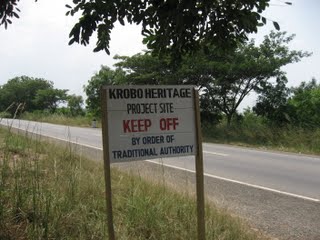 Well, now it's noon, the sun is hot, and I'm walking all alone on an isolated road with no clear notion of where I'm going or what I'm going to find. I hear a rustle in the bushes beside the road. Back at the entrance on the main road opposite the dilapidated sign for the reserve a new sign says "Krobo heritage project site; KEEP OFF by order of traditional authority." The guide book talks about a murdered body that a reader found at the reception area, and here I am all alone. And I'm running out of water. I decide to call it a day and return home. Walking back to the main road I realize just how soon I had turned around; I maybe could have ventured a bit farther. Oh well. A tro-tro stops right away to pick me up, only I don't recognize it as such because it is almost empty and the mate is not yelling a destination. I've never seen either of those before. So, thinking it might be a private vehicle and I'll be grossly overcharged I ask the price, which is the normal price, only the few people in the vehicle are fighting about their fares. This tro-tro is going to Tema, not Accra, but the driver says he will drop me off at the roundabout to pick up another vehicle to Accra. When we get to the roundabout he indicates that I should say in the tro-tro, and when we get to the lorry station he asks where I'm going. Now he realizes that he should have dropped me off back at the roundabout as he originally suggested for the quick and short trip up the motorway back to Legon. So, instead, now I get to see Tema (which looks like more of the same) and I get to enjoy a couple more tro-tro rides along slow, bumpy, dusty, back roads. Three hours later I'm finally back in Legon, hot, tired, sunburned, heat exhausted, and with a very wet lap because when I took water out of the bladder in my camelbak I forgot to close it back up tight and my precious few drops had drained out all over me. So, was it worth it? True, I did need the exercise. And it was nice to get off of campus. But I'm trying to escape my commute, and I ended up spending 6 hrs in tro-tros for a 2-hr hike. Shai Hills is calm and relaxing, and if I were living in Accra it would be a nice break from the hustle and bustle of the city. But the Guest Centre is also quiet and relaxing, and I only need the calming hike after the nerve rattling tro-tro rides out there. After a worse trip back to Legon, I definitely could use another calming hike through a nature preserve.
All my grades are packed...
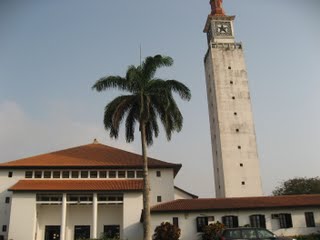 Well, not quite. One of my poor "special admission" students didn't realize that the final was not in our regular classroom (it was in the Great Hall, together with a computer science final), and now I have to wait instructions for how to enter grades online. I've always thought that no one ever learns much in writing a final exam, but a lot can be learned in preparing for an exam. And it looks like my students took the exam seriously, and learned a lot. In retrospect, only giving them the question "Why is Latin America poor" may have been too vague, and additional prompts helped shape, structure, and direct their ideas. One of the students leaving the Great Hall thanked me for a good final exam. I've never been thanked before for an exam, and I wonder exactly what he meant--that it was a fair exam, that he learned a lot in preparing for it? Or, I wonder, the if the exam becomes such a large part of the class that thanking a prof for the exam is, in essence, a way of thanking me for the class, that the exam and the class become one and the same thing? But otherwise my semester comes crashing quickly to an anti-climatic end. I'm beginning to clean the food out of my kitchen. Except for a couple short encyclopedia entries, I've finished everything on my to do list (oh, and I'm still waiting for The Ecuador Reader to arrive from HAHR). All that I have left to do is to read through thousands of digital images of archival documents on my hard drive, and that would be so much easier on my eyes if only I had my 24" monitor (sorry, I have no idea what that might be in cm). Between straining my eyes on the small laptop monitor and heat migraines from temps that now regularly hit 33 every day and seemingly mango allergies, my body hurts and I'm getting ready to go.
Pageantry
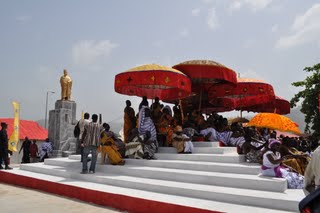 Yesterday I went with two of my history colleagues to Kipi (aka Kyebi) for a durbar of chiefs and people of the Royal Akyem Kingdom in honour of the Okyenhene, Osagyefuo Amoatia Ofori Panin on the occasion of his 10th anniversary on the Ofori Panin Stool. We attended because another of our colleagues, Professor Robert Addo-Fenning, received Okyeman's highest award Okyeman Kanea in recognition of his distinguished achievements in public service and academic contributions to the Royal Akyem Kingdom. 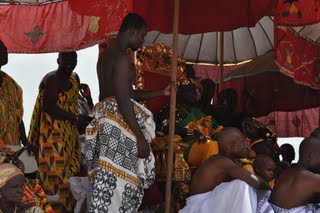 Ok, did that all make sense? I'm not sure of the significance of what I witnessed, but it was the richest ethnographic experience that I have had here in Ghana. At some point someone who studies the Ashanti kingdoms probably will trip across this post and feel the same sort of jealousy I would feel of someone who by virtue of being at the right time at the right place showed up at Transito Amaguana's funeral in Cayambe without really understanding who she was or the deep symbolism of what was portrayed there. Kipi is almost halfway to Kumasi, and we left Legon soon after daybreak for the several hour trip. We traveled through some of the nicest scenery I've seen in Ghana, along an escarpment that my guidebook says is a 700m uplift with a particular rich biological diversity. 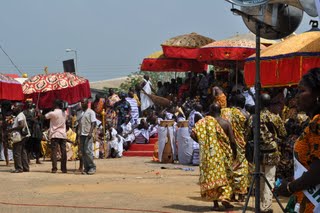 We arrive just as the paramount chief of the Ashanti arrives and mounts his throne (why isn't he sitting on a stool?). All of his slaves are scrambling around serving him, and then sit at his feet. We witness what Kofi calls the "parade of umbrellas" with each sub chief with his own slaves carrying a huge umbrella to shade him from the hot equatorial sun. In an apparent system that completely escapes me, the different sub chiefs gather together with dancers and drumming groups around a large plaza that extends out in front of the chief's palace. One slave with a huge fan cools the royal assemblage. A palace guard with an old rifle comes up behind me and yanks the hat off my head. I am not showing appropriate deference in the presence of the chief. 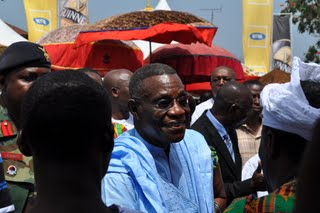 Soon Ghana's president Mills also arrives and walks up through the crowd to greet the chief. He then retires to the opposite side of the plaza where he sits together with his ministers and the foreign diplomatic corps. It provides an interesting division of political and hereditary power. Mills' opponent in the 2008 presidential election from the conservative incumbent NPP party is from Kipi and part of the royal family. Mills is Fante, and dressed in a blue gown rather than the traditional kente cloth that the chiefs wear. He does not have much political support here in Ashanti territory, but it was a wise political move for him to attend this ceremony. It makes me wonder what the ideological divisions in Ghana are, and how many political divisions trace back to struggles between groups for control of government resources.  The ceremony is an interesting mix of tradition and modernity, of extreme wealth in the midst of an impoverished country. The chiefs are dressed in colorful traditional kente cloth, but it is finely woven and they are burdened down with gold adornments (we are in Ghana's primary gold producing area). Young women with beauty queen-type ribbons indicating that they are ushers are all made up with modern makeup and hairdos. Ascension to the throne is matrilineal, and often involves a struggle between eligible male heirs of the recently deceased chief's sister (did I get that right?). The current chief apparently returned from a lucrative career as an insurance executive in the United States to assume this post. We buy a glossy, full color commemorative program that shows the chief playing golf and posing with dignitaries from around the world. In his message to the assembly, he talks about using traditional structures to advance corporate interests, particularly in large-scale mining. Similar to Rafael Correa in Ecuador, he condemns small-scale "illegal" mining as leading to environmental degradation. The celebration even has a website, http://www.okyenhenes10thanniversary.com. 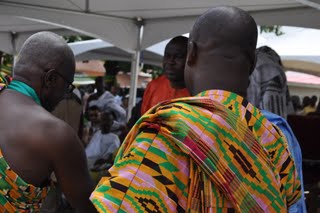 When we arrive, our colleague Professor Robert Addo-Fenning who is to receive the award is in a TV van giving what we assume to be a short interview on the historical background on this event. When he does not emerge, we return to the van and discover that they have set him up with a monitor and he is providing color commentary for the live TV coverage of the event. When it is time for his award, the prof first stands in front of the chief while a citation is read, and then proceeds to the other side of the plaza to greet the president. It happens so quickly I'm not able to position myself appropriately to snap a good picture. Together with the bright equatorial sun and dark shadows under the umbrellas and my hesitancy to use a fill-in flash that would only draw attention to my awkward obruni presence at the event, I fail to get any really good photos. 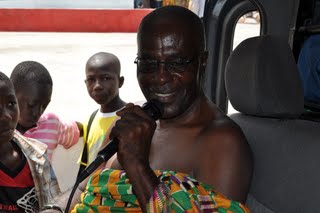 I used to be completely enamored with these types of pageantry and "traditional" cultural expressions. But then I read Michaels' The Trouble with Diversity and became very critical of what I come to see as expressions of false consciousness and the reproduction of class divisions and systems of exclusion. The chief thanks "the old and the young, the rich and the poor, the educated and uneducated, the rural and the urbane," as if class differences were the same as age or regional divisions. Society is divided into the royal ruling class and the subservient slave population, and even though some from the slave class become highly educated they still play the role of a slave because they enjoy being in close proximity to power. The struggle between traditional ruling structures, colonial overlays, and the emergence of pan-African nationalist political projects underlie these events. 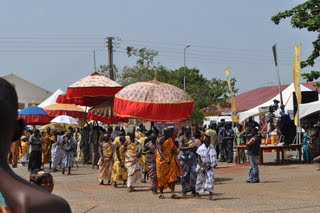 On the way back to Legon, we stop for lunch and then fill up the car with fresh fruit, snails, and mushrooms. I buy pineapples, papaya, oranges, bananas, and mangos (they're coming back into season!). I'm going back north to a cold brutal winter in only three short weeks, and contemplate moving to an entirely fresh fruit diet for my remaining time here. My left eye is almost swollen shut, and a friend reminds me that mangos are related to poison ivy and that I might be having a reaction to it. Do I want to see or eat mango? No he comido mango desde domingo, gimme mango man! A running joke for the day is an alleged quote:  "Thank you for your hostility. You have fed me, and I am fed up. When you come to Uganda, I will retaliate." --Idi Amin to the Queen of England.
Final exams
Final exams are taken much more seriously here at the University of Ghana than they are anywhere that I've seen in the United States. In the U.S., a typical pattern consists of a "stop" or "reading" day at the end of the semester and then a week of exams. Here in Ghana, we just finished the last week of classes (which makes for a very short semester--after losing the first week of classes because things start so slowly and another week to travel, it becomes a 10-week semester). Now we have a "revision" week (as opposed to a day), and then three weeks of exams (as opposed to one day). Yesterday the history department had a retreat to write and review the final exams for our classes. Previously, lecturers only needed to have the exams approved by the head of the department, but now the university wants the entire department to review the exams, apparently following a model that engineering started. At Truman, I have complete autonomy over my final exams. Every semester, the provost sends faculty a memo stating a university requirement that each class have a final exam or an "equivalent learning experience," which sometimes can be something as "educational" as coming to my house to eat enchiladas. So, on Saturday the history faculty heads out of town to the IIAS Guest Centre for the retreat. The justification is that if we met at the department we would be continually interrupted, which is probably true. The original plan was to meet overnite, but some Nigerians were staying at the guest centre, which spoiled those plans. We were supposed to start at 7:30 am, but it was after 10 by the time we ate breakfast and began to get down to business. Almost immediately the electricity went out which interrupted our work. We took up a collection to send a delegate out to buy fuel for the generator to run the laptops, even though we did all of our editing on paper. We then proceeded to lay into a detailed and searing critique of the first exam, and I dreaded what would happen when it was my turn. Not realizing how seriously UG takes its finals, I told my class at the beginning of the semester that they would have one question on the final exam and that was why is Latin America poor. I think it is a brilliant question because it encompasses everything I talk about all semester, and because it does not have a simple or set answer it requires a certain amount of thought and reflection, including interrogating the assumptions of the question itself because, in fact, Latin America is not poor at all but in fact very wealthy (Bolivia and Haiti were two of the richest colonies ever) but except under very rare conditions (Cuba since the revolution, Venezuela today) has the wealth been used to benefit normal people rather than domestic or foreign elites. Despite my insistence, the history faculty would not even listen or entertain the notion. One colleague chastised me for telling the class that this would be a final exam question because, he claimed, they only focused on that one issue and now would give me rote memorized responses (so what, I say, it was the main theme of the class, and as I repeatedly tell students they are graded on their original thought rather than repeating what I say). I argue that the learning is in preparing for the final exam, not in writing it, and if I don't guide the study the students will simply cram a bunch of meaningless factoids that they will promptly forget after the exam. I am told that university regulations require that I give the students between five and seven questions and that they have a choice as to which one they can answer. I have never seen such a regulation, and it would be equally unsurprising for me if indeed such a regulation does exist or whether this is just "the way we have always done things." But in any case, I consent to an exam with six questions divided into three sections with instructions that students should answer one question from each section. Another interesting flip between Truman and Ghana is that at Truman I'm required to proctor my own final exam, whereas UG has a whole examination board that takes my questions and administers the exam outside of my control. I am tempted to subvert the whole process by listing the exam questions on my blog (I assume some students are lurking around here), but I really don't have anything to gain by alienating my colleagues at UG. So, in the end, the question of why Latin America is poor is not on the final exam, but as I told my colleagues the six questions all ask that same question, though from different and more specific perspectives. If the students reflect on that broad question of why is Latin America poor rather than memorizing facts they should do fine. After lunch, we quickly blew through the last couple of exams and then left at about 3 pm, but everyone agreed that next year we needed more time and should do it as a two-day retreat. I've been told that the only time Ghanians stay at hotels is as part of a business meeting, as a fringe benefit of a job, I guess. In a way it was nice hanging out with my colleagues and interacting with them on a social and intellectual level, something that my colleagues at Truman complain that we do not do often enough. So, now we're suddenly at the end of the semester but there is a month left and it feels as if that time will last a lifetime but (due to the principle of relativity in any experience) will go by in a flash. My book ms is sent off, I've returned all the articles and book chapters that keep coming back for more revisions, and I've written the reviews of the books I have here (tho I am waiting for one more book to come from HAHR). There is always more that I can do (prepare for my Panama classes for the spring, work on my promotion portfolio, read through the digital images of archival documents that I have on my hard drive). I feel, though, as if I'm in the eye of the hurricane and wonder if I should just relax and enjoy this momentary lull. Part of me looks forward to going home (where ever and whatever that is), and part of me dreads the stressful crush of facing a semester-long backlog (at least two books to review, probably some revise and resubmits coming back by then, and who knows what else).
| Marc Becker's Home Page
| marc@yachana.org |
|

